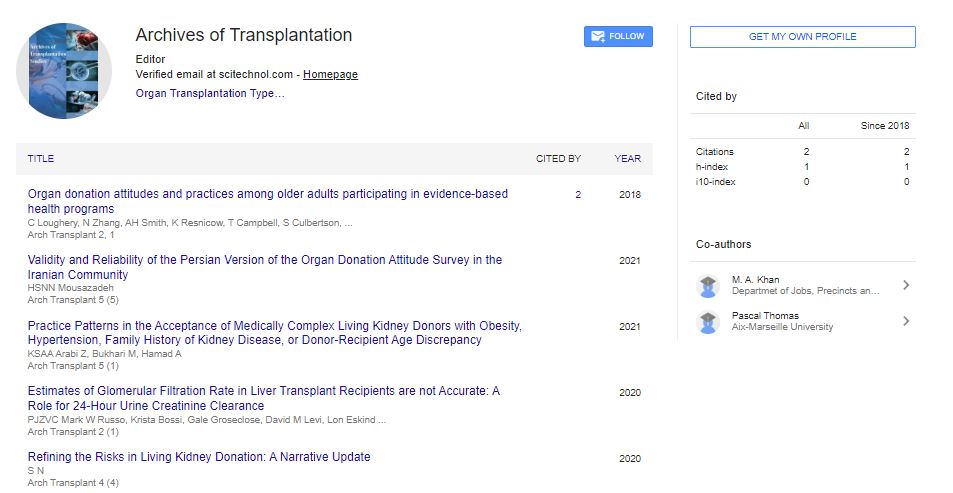Commentary, Arch Transplant Vol: 7 Issue: 3
Impact of Machine Learning Algorithms on Organ Allocation in Kidney Transplantation
Hiro Ichinohe*
1Department of Internal Medicine, The Jikei University School of Medicine, Tokyo, Japan
*Corresponding Author: Hiro Ichinohe,
Department of Internal Medicine, The Jikei
University School of Medicine, Tokyo, Japan
E-mail: ichinohehiro@gmail.com
Received date: 02 September, 2023, Manuscript No. AT-23-116163;
Editor assigned date: 04 September, 2023, PreQC No AT-23-116163(PQ);
Reviewed date: 18 September, 2023, QC No AT-23-116163;
Revised date: 25 September, 2023, Manuscript No AT-23-116163(R);
Published date: 05 October, 2023, DOI: 10.4172/AT.1000146.
Citation: Ichinohe H (2023) Impact of Machine Learning Algorithms on Organ Allocation in Kidney Transplantation. Arch Transplant 7:3.
Abstract
Description
Kidney transplantation is a life-saving procedure for patients with end-stage renal disease. However, the demand for kidney donors far exceeds the supply, leading to challenges in organ allocation. Machine learning algorithms have emerged as a major promising tool to optimize organ allocation, enhance patient outcomes, and reduce waiting list mortality. Kidney transplantation is the gold standard treatment for end-stage renal disease, offering patients a better quality of life and improved survival compared to dialysis. However, the scarcity of available kidneys for transplantation has led to a complex organ allocation process. The conventional allocation system primarily relies on clinical factors, waiting time, and human judgment, resulting in suboptimal outcomes and prolonged waiting times for patients in need. In recent years, machine learning algorithms have gained prominence in healthcare applications, offering the potential to enhance the efficiency and fairness of organ allocation.
Current organ allocation practices
The current organ allocation system is primarily based on factors such as blood type compatibility, HLA matching, waiting time, and the severity of the patient's condition. While these factors are essential, they do not fully account for the complexity of kidney allocation. This approach often leads to suboptimal matches and inefficiencies in the distribution of available organs.
Machine learning in kidney allocation
Machine learning algorithms have shown promise in improving kidney allocation by considering a broader range of variables and optimizing the allocation process. These algorithms can incorporate patient characteristics, organ quality, geographic factors, and donorrecipient compatibility to make more informed allocation decisions. They can also adapt and learn from historical data to continuously improve their performance.
Some machine learning techniques used in kidney allocation include decision trees, random forests, support vector machines, and neural networks. These algorithms can identify patterns and relationships in large datasets, enabling more accurate and dynamic organ allocation.
Benefits of machine learning in kidney allocation
Enhanced efficiency: Machine learning algorithms can significantly reduce the time required for organ allocation. By analyzing vast amounts of data quickly, they can match donors and recipients more efficiently, reducing waiting times for patients.
Improved fairness: Machine learning models can incorporate additional factors, such as socioeconomic status and geographic location, to promote fairness in organ allocation. This ensures that organs are distributed equitably among different patient groups.
Better outcomes: Optimized organ allocation through machine learning can lead to improved transplant success rates and patient outcomes. Algorithms can consider factors like organ quality, recipient health, and donor-recipient compatibility to maximize the chances of a successful transplant.
Reduced waiting list mortality: By streamlining the allocation process and matching donors more effectively, machine learning can help reduce waiting list mortality rates, ultimately saving lives.
Challenges and ethical considerations
While machine learning offers substantial benefits, there are challenges and ethical considerations to address. These include data privacy, bias in algorithms, transparency in decision-making, and the need for ongoing validation and monitoring of algorithm performance. Ensuring that machine learning algorithms are fair and equitable in their allocation decisions is of paramount importance. The field of machine learning in kidney transplantation allocation is rapidly evolving. Future research should focus on refining existing algorithms, addressing ethical concerns, and expanding the use of real-time data to improve allocation decisions. Collaborations between healthcare providers, data scientists, and policymakers will play major role in advancing the adoption of machine learning in organ allocation.
 Spanish
Spanish  Chinese
Chinese  Russian
Russian  German
German  French
French  Japanese
Japanese  Portuguese
Portuguese  Hindi
Hindi 